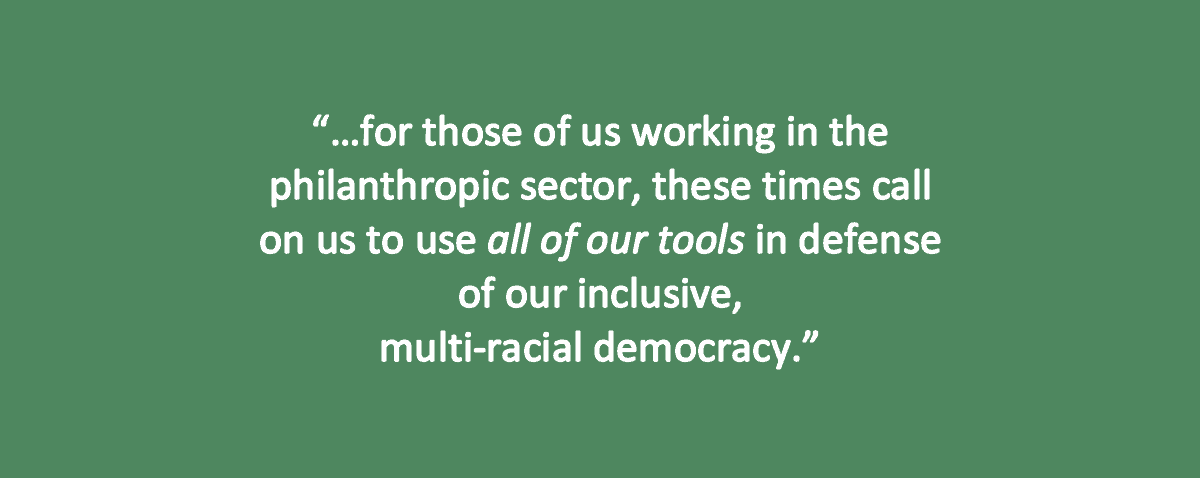
We live in dangerous times, and every passing news cycle contains another outrage, another violation of norms, another threat to our democracy, another threat to our planet.
In the face of escalating racial attacks, (be it imprisonment of kids on the border or the racist rhetoric being tweeted from the white house) many have noted, rightly, that philanthropy as a sector has been too cautious and too quiet. The Communications Network, in it’s recent piece, Silence Speaks Volumes, calls on foundations to use their voices in this moment.
Yes, it’s meaningful for people from all sectors of our society to condemn the Administration’s attacks on people of color. And, for those of us working in the philanthropic sector, these times call on us to use all of our tools in defense of our inclusive, multi-racial democracy. We are more than commentators or observers– as funders, our role is to resource a more just and equitable future. What we do in this moment will be far more important than what we say.
As painful as this moment is, it is also a time in which the work to be done has become more clear. The vulnerability of our democracy has become more clear. Racial anxiety and social divisions are being stoked in order to prop up a reckless system that benefits only the wealthiest. As we condemn the most recent of a long list of outrages, can we also use this moment to deepen our own clarity of purpose, and ensure that our funding will bring about a more just future?
As funders, we can not only speak out but also take action to bolster our inclusive democracy.
- Support those most directly impacted by injustice. Instead of wielding of our own voice and power as a foundation, we can support those most directly impacted by injustice to build their voice, power, and leadership. They must lead the way to a more just world; it is our job to uplift and resource their visions and voices. National organizations such as Color of Change, New American Leaders, and National Domestic Workers Alliance, regional and state-based organizations such as Western States Center, Black Voters Matter and Workers Defense Project and so many others are seeding a future in which racial, gender and economic justice will be the norm.
- Invest in the creation and dissemination of narratives that reshape cultural attitudes around belonging in our country. The recent escalation in the use of racist and sexist rhetoric is not happening in a vacuum– rather it builds on broader public narratives shaped by white supremacy and male dominance. We need to normalize new narratives that humanize all of us, that value all of us. Organizations such as the Pop Culture Collaborative, ReFrame, and the Culture Change Fund, for example, build capacity for narrative equity and culture shift.
- Question the default funding habits and practices that limit us from making a bigger impact in this moment. As funders, we sometimes have a blind spot for how our internal practices create unnecessary burdens and barriers for organizations that do the important work we support. This moment calls on us to question our practices, shift to ways of working that account for the gravity of the problems we face, and center the people who are leading the social change efforts we support. Could your foundation increase its payout, provide more general operating support, increase the length of grants, and minimize busywork for grantees? Could you shift your grant strategy to more boldly meet the moment or more directly address the imbalances of power in our society? The Trust Based Philanthropy Network has tools and stories of inspiration from foundations who have increased their impact by changing their practices.
So many of us in philanthropy are eager to do something meaningful in this tumultuous time. Let’s challenge ourselves to use this moment to put our institutional values into practice. Let’s walk the walk as boldly as we talk the talk.
